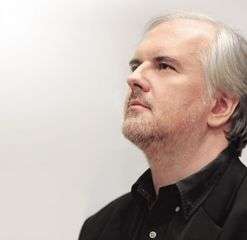|
Back
More excitement from Montreal Toronto
Koerner Hall
10/05/2018 - & October 4, 2018 (Montreal)
Nicolas Gilbert: Avril
Sergei Rachmaninov: Piano Concerto No. 4 in G Minor, op. 40
Jean Sibelius: Symphony No. 1 in E Minor, op. 39
Nicolas Angelich (Piano)
Orchestre Métropolitain, Yannick Nézet-Séguin (conductor)

N. Angelich (© Jean-François Leclercq)
Capping the opening week of Koerner Hall’s 10th anniversary season was this flying visit by Montreal’s Orchestre Métropolitain under Yannick Nézet-Séguin, its music director since 2000 (when he was 25). Their last visit here (and quite the sensation) was in 2015.
The program opened with a rather puzzling 14-minute piece, Nicolas Gilbert’s symphonic poem, Avril, which had its premiere the evening before in Montreal. The April he conjures up is tangy and eventful (early spring isn’t always smooth going in a northern clime), and the piece becomes an exercise in coloristic development in the last of its three sections. The composer (who has also written four novels with musical tie-in) was present.
Rachmaninov's 4th Piano Concerto is one of those pieces overshadowed by its two more familiar “neighbouring” concertos. It’s opening phrase is quite the attention-grabber as it is the kind of cadence one would expect as the culmination of a lengthy development (and it reappears in the third movement). Nicholas Angelich, a pianist new to me, has a truly impressive technique that deftly combines both power and delicacy. It was a truly masterful performance, building up in the end to what I can only describe as a finely calibrated collision between the full-force orchestra and piano in which no-one got hurt and everyone was grateful.
Mr. Angelich’s encore was the gentle opening piece from Robert Schumann’s Kinderszenen, beautifully played.
The Sibelius Symphony No. 1, like the Vaughan Williams the orchestra played three years ago, challenged the acoustic capabilities of the hall, but everything maintained clarity. The work demands solo contributions from many players and all performed with distinction. The conductor’s taut handling of the symphony grew in intensity until it resembled a carefully-controlled thermonuclear explosion (of the benevolent type, if such there be).
I realize that I have used rather violent metaphors in this review: a “collision” at the end of the Rachmaninov concerto, and an explosion for the Sibelius symphony. Nézet-Séguin, in his close-fitting white smock that resembles something surgical, is a kind of sonic engineer who can calculate trajectories that barely avoid becoming catastrophic. We are grateful once again for another enthralling musical experience.
Michael Johnson
|